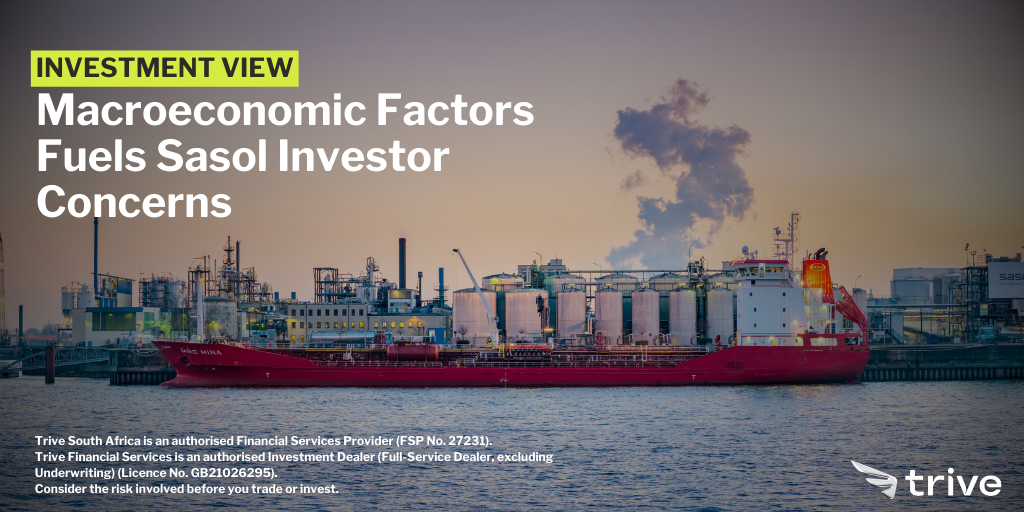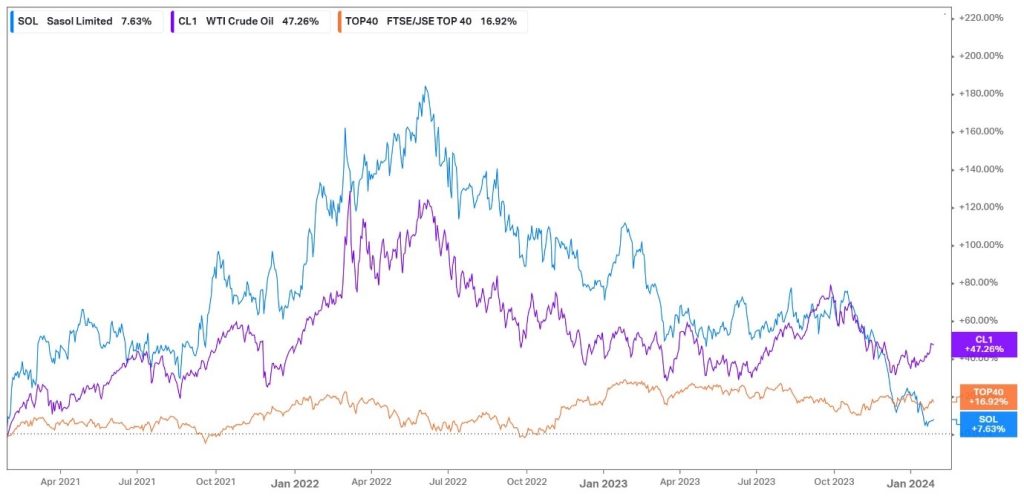
Sasol Limited (JSE: SOL) recently unveiled its performance metrics for the six months ending December 31, 2023, offering insights into its production and sales. In the face of a macroeconomic environment characterized by volatile conditions, Sasol, a prominent player in the chemical and energy sector, grappled with challenges stemming from weaker oil and petrochemical prices, unpredictable product demand, and inflationary pressures.
Acknowledging the impact of these factors on its operations, the company anticipates continued pricing pressures that may affect sales volumes, margins, and overall profitability. Despite these hurdles, Sasol’s management remains steadfast in its confidence, reinforcing previous guidance for production and sales throughout the 2024 financial year.
As Sasol navigates this challenging macroeconomic environment, the question arises: Can the company bounce back in the coming year, overcoming recent struggles, or will it continue to face the ongoing challenges that have marked its recent performance?
Technical
The weekly chart shows the bearish pressure in the steep downtrend extending from June 2022. The company’s share price has closed in the red for 13 of the last 15 weeks and pushed through the 61.8% Fibonacci golden ratio at R181.08. However, the RSI indicates that the share could be oversold, hinting at the possibility of a bullish bounce.
As long as the price remains above the R155.22 barrier, a retracement could occur to retest the R181.08 level. The bulls need to clear this resistance to enforce a meaningful uptrend. If it clears, the price could look toward R205.75 before potentially reaching the 25-SMA (green line) at R216.03 and the 50-SMA (blue line), where it converges with the prior Fibonacci midpoint at R230.33 in the longer term.
However, should the price fail to clear resistance at R181.08, the bearish momentum could continue. Support is established at R155.22, and an additional breakdown at this level could send the price tumbling toward neckline support at R129.13 as we advance.

Fundamental
Sasol’s share price has lost close to 12% in the year’s opening month, adding to the 31% loss in 2023. Despite this, the share price has appreciated over 7% over the last three years. From the graph below, it becomes clear that the price action is correlated with the WTI futures (NYMEX: CL), which has returned over 47% in the same period, highlighting the company-specific factors that have led to underperformance. The JSE Top 40 Index has returned close to 17% in those three years, but it is clear that Sasol’s cyclical nature leaves the potential for future outperformance. With a beta of 2.14, its volatility could open lucrative opportunities, and while the price is at the wrong end of the volatility as things stand, there could be room for a promising bounce-back when the macroeconomic conditions pivot.

In its mining business, Sasol reported a 1% year-over-year decline in saleable production to 15.1 million metric tons despite a 6% increase in overall mining productivity. In its second quarter of 2024, productivity declined by 8% compared to the first quarter, attributed to safety-related incidents and operational challenges. The productivity for the full year is forecasted to remain within its prior guidance of 975 – 1 100t/cm, but management expects to hit the lower end of this guidance after the challenging second quarter performance.
Its chemical business’s external sales increased by 4% to 3.16 million tons, but its revenue declined by 21% to $3.78Bn. This decline was mainly driven by a 24% drop in the average sales basket price as a result of lower oil and energy prices due to the weak market demand. On an optimistic note, oil advanced by over 6% last week due to the recent escalation of geopolitical tensions in the Middle East that have triggered concerns around the supply environment. This comes as Houthi rebels have stepped up their attacks on ships in the Red Sea.
In its gas business, Mozambique’s gas production for the first half of the financial year was 10% higher than the year-ago period as three additional wells came online. For the full year, gas production volumes are expected to remain between 113 – 119bscf, which aligns with the market guidance previously given.
Finally, its fuel business showed an increase in production volumes of 8% at its Secunda Operations to 3.50 million tons. Compared to the first quarter of 2024, the second quarter showed a 12% increase, and the guidance for the full year remained unchanged at 7.0 – 7.3 million tons.
Summary
Sasol’s operations have been strained significantly by macroeconomic factors, such as weaker oil and petrochemical prices, volatile demand, inflation, and underperformance of state-owned enterprises in South Africa, such as Transnet and Eskom. This has led to a year-to-date decline in its share price of over 12%. While management expects these pricing and demand volatility to be sustained over the next two quarters, it kept its production guidance for the full year intact, which could play a pivotal role in the company’s road to recovery when the macroeconomic pressures start to ease.
Sources: Koyfin, Tradingview, Reuters, Sasol Limited
Piece written by Tiaan van Aswegen, Trive Financal Market Analyst
Disclaimer: Trive South Africa (Pty) Ltd (hereinafter referred to as “Trive SA”), with registration number 2005/011130/07, is an authorised Financial Services Provider in terms of the Financial Advisory and Intermediary Services Act, 37 of 2002. Trive SA is authorised and regulated by the South African Financial Sector Conduct Authority (FSCA) and holds FSP number 27231. Trive Financial Services Ltd (hereinafter referred to as “Trive MU”) holds an Investment Dealer (Full-Service Dealer, excluding Underwriting) Licence with licence number GB21026295 pursuant to section 29 of the Securities Act 2005, Rule 4 of the Securities Rules 2007, and the Financial Services Rules 2008. Trive MU is authorized and regulated by the Mauritius Financial Services Commission (FSC) and holds Global Business Licence number GB21026295 under Section 72(6) of the Financial Services Act. Trive SA and Trive MU are collectively known and referred to as “Trive Africa”.
Market and economic conditions are subject to sudden change which may have a material impact on the outcome of financial instruments and may not be suitable for all investors. Trive Africa and its employees assume no liability for any loss or damage (direct, indirect, consequential, or inconsequential) that may be suffered. Please consider the risks involved before you trade or invest. All trades on the Trive Africa platform are subject to the legal terms and conditions to which you agree to be bound. Brand Logos are owned by the respective companies and not by Trive Africa. The use of a company’s brand logo does not represent an endorsement of Trive Africa by the company, nor an endorsement of the company by Trive Africa, nor does it necessarily imply any contractual relationship. Images are for illustrative purposes only and past performance is not necessarily an indication of future performance. No services are offered to stateless persons, persons under the age of 18 years, persons and/or residents of sanctioned countries or any other jurisdiction where the distribution of leveraged instruments is prohibited, and citizens of any state or country where it may be against the law of that country to trade with a South African and/or Mauritius based company and/or where the services are not made available by Trive Africa to hold an account with us. In any case, above all, it is your responsibility to avoid contravening any legislation in the country from where you are at the time.
CFDs and other margin products are complex instruments and come with a high risk of losing money rapidly due to leverage. You should consider whether you understand how these products work and whether you can afford to take the high risk of losing your money. Professional clients can lose more than they deposit. See our full Risk Disclosure and Terms of Business for further details. Some or all of the services and products are not offered to citizens or residents of certain jurisdictions where international sanctions or local regulatory requirements restrict or prohibit them.




